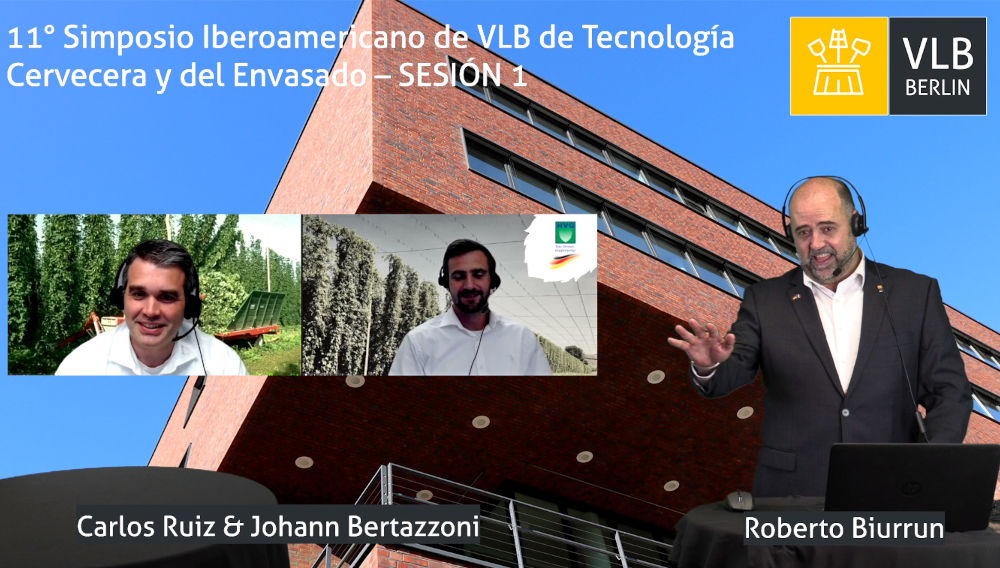11th Ibero-American VLB Symposium online: Excellent resonance
Digital format | After the cancelation of the Symposium last year, which was originally scheduled to be held in Barcelona, Spain, clouds of storm loomed over this important event again. Although in Europe this year the mobility situation derived from the pandemic has improved considerably, in other regions, particularly in Latin America, there are still restrictions that would make it impossible for Latin American brewers to participate in a “face-to-face” conference. This is how VLB Berlin decided, before canceling the Ibero-American Symposium again, to carry it out in digital format.
"Based on our experience of other conferences held since the end of last year online (IBWC, ICBO, SAFB, Africa Brewing Conference, etc.), we thought it was a reasonable alternative under the circumstances", said Roberto Biurrun, responsible of the organization of the Symposium.
From September 21 to 23, more than 200 participants, from 21 countries, gathered at the VLB Virtual Campus. Among the innovations and peculiarities of the event platform and the conference itself, was the fact that for the first time in an online VLB conference, both the moderation, as well as almost all the presentations were made in Spanish (originally or with translation), with the participation of collaborators from the different VLB institutes.
The event was opened by VLB CEO Dr. Josef Fontaine, who welcomed all participants and sponsoring companies, highlighting the importance of Ibero-America for VLB. Sharing the stage – in a live broadcast from the VLB studio located in Berlin –, Roberto Biurrun, Executive International Sales Manager, also thanked the collaborating companies, and extended his congratulations and thanks to the VLB team involved in organizing the event, for the incredible effort made.
The beverage market in Latin America and raw materials
At the beginning of the presentations, Erwin Enriquez (Euromonitor) shared a detailed vision of the beverage market in Latin America. The sessions on Tuesday focused on raw materials. Under the slogan “Malts and hops, influencing the character of the beer”, Brent Atthill (RMI Analytics) opened the first session and outlined the market situation from the point of view of raw materials (mainly barley), especially in their relation to the Ibero-American beer market. Jaap Rommelaar (ZoomAgri) shared with the participants an innovative alternative for the recognition of varieties in agriculture through artificial intelligence. Alirio Caldera (Weyermann) continued, presenting the alternatives for the use of specialty malts as an option for differentiation in the brewing industry.
Hops and their use had a predominant position: Both Alexander Feiner (Hopsteiner) as well as Carlos Ruiz and Johann Bertazzoni (HVG) presented interesting approaches in their presentations. VLB Berlin, represented by Florian Schrickel, introduced groundbreaking research results on the reuse of residual hops from the dry hopping process.
Brewhouse: process aspects, technology and hops dosing
On the second day, Konstantin Ziller and Gustavo Acioli (Ziemann Holvrieka) shared a proposal to increase the isomerization rate of hops. In a practical presentation, Indalecio Morales and Raul Martinez (both from Landaluce) highlighted an issue often ignored by brewers: the filterability coefficient and its implications in the process. Karl Stamm (Steinecker) showed the new developments regarding equipment related to the use of hops in the brewhouse.
Fermentation
The third session was dedicated to the fermentation process. Burghard Meyer (VLB Berlin) presented an interesting research project related to continuous fermentation using cross-flow modules. He was followed by Marcelo Cerdan (Fermentis), who focused on the production of non-alcoholic beers through the use of unconventional yeasts. At the end of the day, Helga Gschwind (Anton Paar) described the measurement alternatives for the online monitoring of fermentation and the measurement of CO2 purity.
Filtration & Packaging Technology
On Thursday, the last day of the conference began with a presentation by Rodrigo Zampa (Rovi Ingenieria) titled "intelligent filtration: connectivity and control." Marc Eckert (Bucher Unipektin) followed with a comparison of the two predominant beer filtration technologies: Diatomaceous vs. "cross flow" filtration. Already in the packaging area, Stan Hume (Sidel) shared the innovations in flexible packaging of differentiated products such as hard seltzer and other RTD beverages. The fourth session ended with a presentation by Anton Diehl and Eduardo Thiel (both from Heuft), where they talked about the detection of glass particles in the container by means of X-ray inspection and the support of artificial intelligence technology.
Sustainability, Water treatment and CO2 recovery
The fifth and last session of the Symposium focused on aspects of sustainability and water management. In a discussion panel led by Matthias Hahn, Sören Storbeck, Andre Böddeker and Jonathan Lorenz from KHS introduced innovations in the packaging area suitable for more sustainability in the production lines.
Legionella present an imminent risk of water contamination in the respective productive processes. Martin Hageböck (VLB Berlin) shared his experiences from an analytical point of view and emphasized the importance of controlling possible sources of contamination. Alfons Ahrens, also part of the VLB Berlin team, then continued with his presentation focusing on the management and optimization of water consumption in the brewery. Finally, Gabriel Dominguez (Rovi Ingenieria) introduced alternative methods to increase the efficiency of the use of CO2 in breweries.
Virtual exhibition
The three days of the Symposium were accompanied by a virtual exhibition, where the participants made use of the opportunity to learn about the wide portfolio of the participant suppliers of raw materials and production equipment, and were able to contact the exhibitors directly and share their thoughts through video calls.
As part of the dynamics of the conference, each presentation was followed by a live Q&A session. In addition, interaction between participants and speakers was encouraged through discussions in a group video chat, which is part of the VLB Virtual Campus tools.
Next year, the 12th Ibero-American Symposium of VLB will be held on-site, if the situation allows it.
Keywords
Germany brewing science industry meetings conferences international brewing industry
Source
BRAUWELT International 2021
Companies
- Versuchs- und Lehranstalt für Brauerei in Berlin (VLB) e.V., Berlin, Germany

